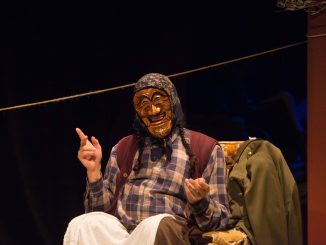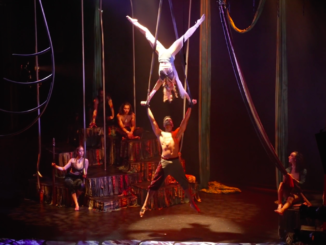
[Mana Wahine]
Beneath Skin and Bone (BSAB) is set in a world where waiata and music is shunned, and our protagonist Poto (played by Trae Te Wiki) finds herself in a new city, running away from the constant chatter of her whanau. With a little intervention from the spiritual world, Poto is forced to face her fears, her family’s past and, in the process, deal with her own feelings of loss and identity.
Behind this production is a strong team of women bringing both Māori and female representation to the stage by creating space for two wahine actors and utilising the Māori world of the patupaiarehe. Trae Te Wiki (25) decided to write a play where she could act alongside her younger sister Tial (11), and then joined forces with Wellington collaborators Neenah Dekkers-Reihana and Hannah Kelly to bring BSAB to Te Pou Theatre.
The show opens with a waiata but quickly shifts and takes us to present day where we find Poto muddling through her “quarter-life crisis”, sitting alone in a half unpacked flat. Accompanying the performance is a three-piece band who begin to play with Poto, tempting her with notes and chords, encouraging her to sing, but she resists. Reality starts to mess with her head as Poto turns away from the deeper truth she is afraid to admit, her gift as a caller to the patupaiarehe, and also the loss of a friend. To encourage Poto to deal with her past she is visited by a patupaiarehe, played by Tial, who proceeds to push Poto in the right direction, with or without her consent. The present day narrative follows the hijinks of the spiritual visitor as she intervenes in Poto’s life.
Te Pou’s Rangitahi season is a space for emerging artists to test the waters and flex their muscles, and the team of young women behind BSAB have put together something promising. Whilst the storyline gets a little confusing after the first twenty minutes, the visual and aural elements of the show keep the audience interested, and the tenderness of Poto’s loss and longing carries the narrative. The banning of waiata and all forms of music is an integral plot point that could be emphasised and stretched further in order to strengthen the muddy narrative. The stakes are currently too weak, making it a hard task for the actors to deliver the final scenes with enough emotional weight. The sections of the play that sit in the present-day lack enough direction to pull the plot forward confidently, but the interaction between Trae and Tial is enjoyable to watch. On the other hand, the monologues that frame and structure the play lean on exposition and push the plot forward, however the heavy exposition can feel a little on the nose. During the monologues we get to see Trae Te Wiki really shine in moments of vulnerability that are a credit to her acting skill and ability to connect with the audience. Combining two very different performers together on stage is a gamble and the sense of play between the two sisters is evident. Tial, at only eleven, lacks the ease and training for the kind of performance that Trae Te Wiki can deliver, yet her performance shows her off as a promising young talent to watch.
The strength of the piece lies in its mix of elements. The use of movement, shadow play and music weave together to create a rich framework for the narrative to sit in, however, at present the story lacks enough substance to culminate in a satisfying ending. This work is a glimpse into what the team behind BSAB have to offer, let us hope that they continue working this piece and together in the future to form something just as charming and a little more solid.
Beneath Skin and Bone plays at Te Pou until 21 April as part of the Rangatahi Season.




Leave a Reply